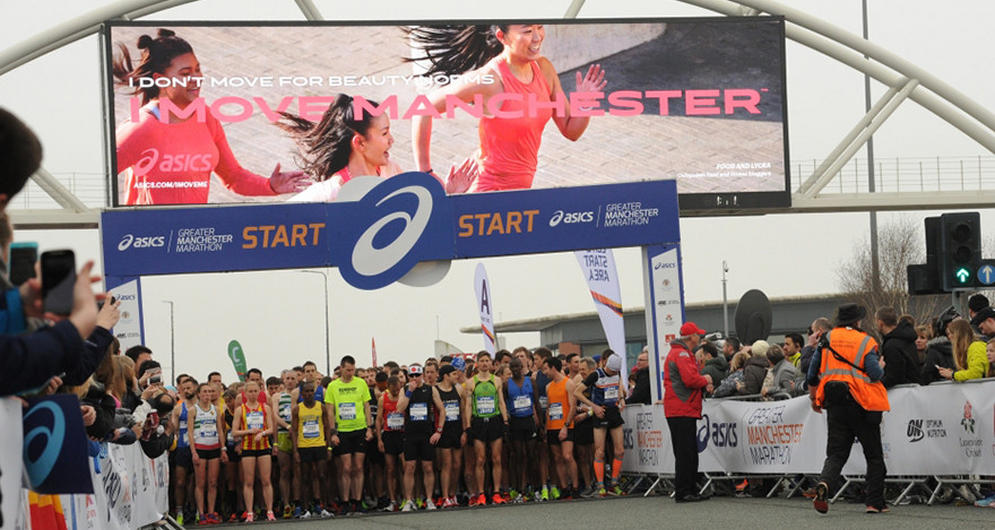Optimum Nutrition Expert: Kim Ingleby, Award-Winning Mind Body Coach, Team GB Sports Therapist and Athlete.
“The greatest revolution of our generation is the discovery that human beings, by changing the inner attitudes of their minds, can change the outer aspects of their lives.” — William James
For some reason you may have signed up for a race — first time, PB, improving, charity event or a personal challenge. A few months later you are training and following a physical plan, helping you to feel fitter, stronger and ready for your competition or race.
But what can you do to train your brain for optimal performance? How can you overcome the ‘wall’, complete that marathon and enjoy it? How can you believe that you can actually do it?
I work with many international athletes and beginners in sports from rugby to running, triathlon to stage competitions — all with the aim of enhancing their performance, overcoming fears and doubts, and getting to the finish line having enjoyed the experience.
Training your brain is like training any muscle in your body — the more you do it, the more effective and powerful it becomes. Races can be won or lost, completed or unfinished, on the mental state of the athlete, often disregarding the amount of physical training they have done.
I am going to share some of the top mental strength training tips with you! Grab a notebook (make it your Mind Ninja Journal) and get involved — these will strengthen your training for any goal and enhance your enjoyment and focus.
Top Tips for Your Race Day
The weeks leading up to a big event
1. Become really clear on your motivation
Write down all the reasons why you are aiming to run the marathon and next to each reason note why it’s important to you and how it makes you feel — all stated positively. Then highlight the top three motivators and pin them somewhere to remind you when motivation is low. It’s important to write things down — this clarifies your thinking and makes goals more real.
2. Make a plan that works for you and stick to it
Write down the amount of training you’ll do per week to reach your marathon goals (ask a qualified professional for guidance if needed). Then list your other commitments — family time, social events, and rest — and prioritise them in your diary. By planning training and recovery realistically, you’ll stay consistent, feel in control, and have the support of those around you.
3. Make yourself accountable and believe in yourself
Once you have a clear plan and focus, tell two positive people what you are aiming to do and how they can support you. By sharing your goals, you’re far more likely to achieve them and enjoy the process. Choose people who will encourage you and lift you up.
4. Keep a feel-good training diary and use positive self-talk
In addition to logging your physical sessions, write down how you felt mentally — different routes, times of day, moods, sleep, food, and company. This will help you spot patterns and make adjustments. If something drains you, change it; if something energises you, repeat it. Awareness creates progress.
5. Be flexible and listen to your body
Be kind to yourself — you have goals, but flexibility is key. If you need to move a rest day, do it. If you’re feeling constantly tired or unmotivated, review your nutrition and recovery. Quality protein, carbohydrates, sleep, and hydration all matter. Without them, both mind and body will suffer.
6. Model qualities and training from people who inspire you
Choose two or three athletes who inspire you and ‘act as if’ you have their qualities. For example, if you admire determination, strength, or calmness, observe how they behave and imagine feeling that way yourself. You can model anyone — an athlete, friend, or public figure — who represents traits you’d like to embody.
7. Anchor positive qualities for your race
Decide on the four mental qualities you need most — such as calm, focus, energy, or confidence. Recall times when you’ve felt these before, or moments and music that represent them. During training, breathe in these feelings and release doubt. Pressing your thumb and forefinger together while focusing on them can create a physical ‘anchor’ — a cue you can use during the race to recall that mindset.
8. Create a clear, positive outcome
Take a large sheet of paper and write in the middle: “What do I need to make [your race name] a really positive experience and do my very best on the day?” Around it, list everything — training, support, food, clothes, feelings, and goals. Make your vision detailed and exciting, then use it as your motivation. Set post-race goals too to help keep perspective if things don’t go perfectly on the day.
The Race and After
Start
Remain calm, focused, and quiet — follow your own plan. Avoid wasting energy on pre-race chatter about nerves or injuries. Focus on breathing, visualising success, and staying in your zone — relaxed yet powerful.
During
Stay focused on what you want and your own race. Don’t get distracted by others who seem faster or better equipped. If you lose pace or start to panic, breathe, refocus, and use your anchors to return to your strong mindset. Remember: relaxed focus creates energy and power.
After
Be kind to yourself and acknowledge what you achieved. Even if it wasn’t your personal best, it was the best effort you could give on that day. Reflect constructively on what went well and what to improve, and celebrate your success. Gratitude and positive reflection fuel long-term progress.
Final Thoughts
Some may say it’s easier said than done, but staying stuck is even harder if you have a dream you truly want. The journey takes effort, commitment, and consistency — and yes, moments of doubt — but it’s worth it a thousand times over. Plan your travel, taper, nutrition, and hydration carefully, adapt to whatever race day brings, and above all — enjoy it.
Kim works with Olympic, County, and everyday athletes looking to enhance performance and find more joy in competition. She has supported athletes around the world, competed at the World Triathlon Championships, trekked across the Andes, built pipelines in Nepal, and completed nine marathons — including one in Sierra Leone. Let her help you push your limits and realise your potential.






